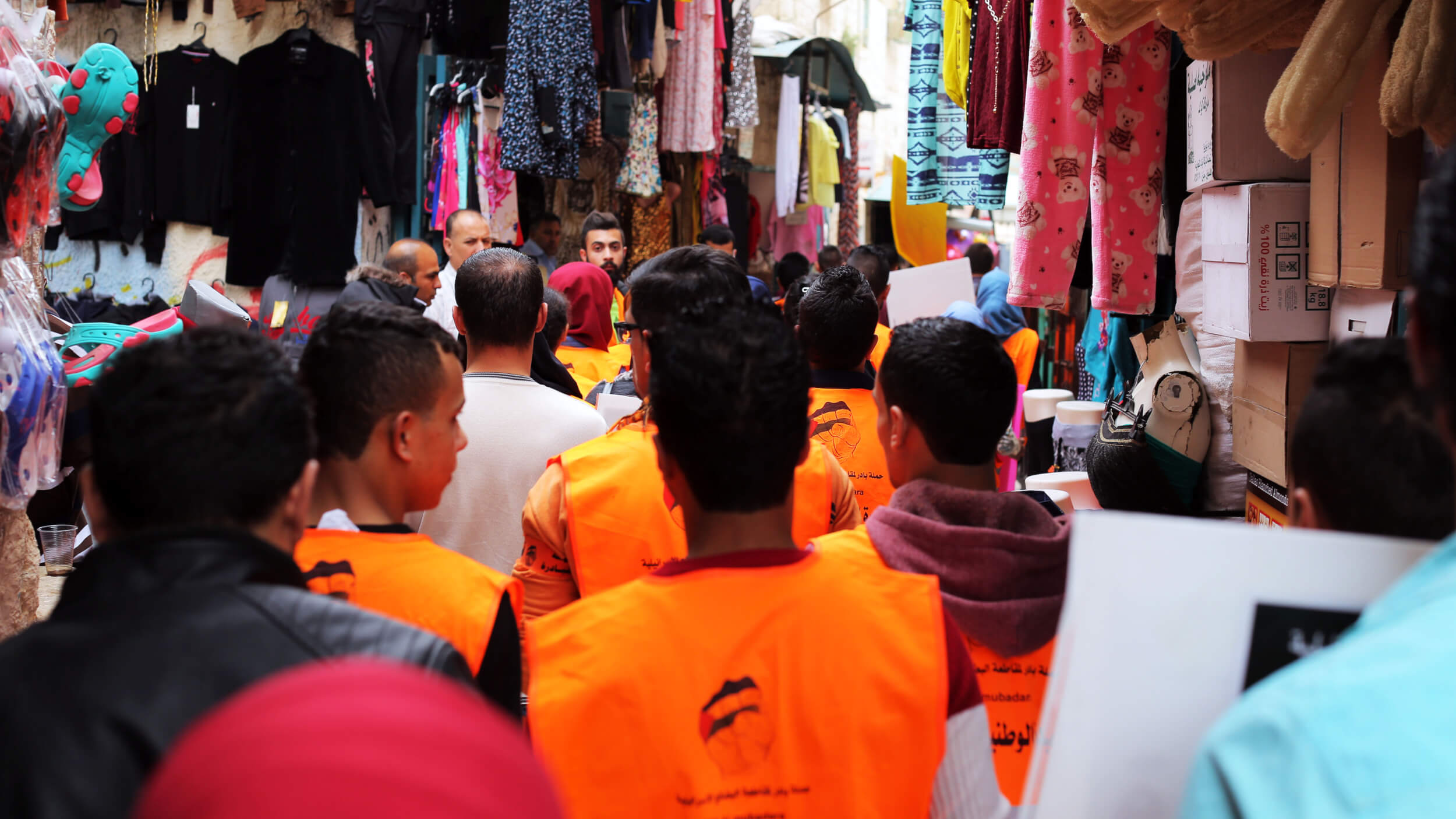Dozens of students with Mustafa Barghouti’s Palestinian National Initiative (PNI) marched in the occupied West Bank city of Bethlehem to encourage business owners to get behind the Boycott Divestment and Sanctions movement on Sunday.

Protesters gathered in one the main intersections in Bethlehem and walked throughout the city, chanting slogans like “Palestine is invaluable,” and “stop supporting the occupation’s bullets,” while wearing bright orange vests branded with the PNI and BDS logos to symbolize Palestinian workers.

Rayda Izboon, a student and supporter of the PNI party, told Mondoweiss that she believed it was important for Palestinians to understand that selling Israeli products only “supports the occupation,” and stressed that Palestinian factories produce quality products and create jobs for hundreds of Palestinians.

The demonstration comes just days after British Security firm G4S announced it would sell its businesses inside Israel within the next two years.
G4S has been a major target of the international BDS movement, and while the company has stated that the closure of its Israeli business was not due to pressure from Pro-Palestinian camps, the BDS movement both inside Palestine and abroad, consider the announcement a win for BDS.

While the BDS movement in the occupied West Bank and East Jerusalem has largely focused on boycotting settlement products, protesters in Bethlehem on Sunday said they believed that business can do more, and called for boycotts on all Israeli products, within Palestinian’s means.
Wafeeq Hamidat, an English teacher and supporter of BDS and the PNI traveled to Bethlehem from the southern occupied West Bank district of Hebron to attend the event.
Hamidat said that Israel has made it nearly impossible to boycott staples like rice, wheat, sugar and petrol, as Palestinian markets do not produce enough, or any, of such products.
“But things like milk, cheese, yogurt, juice, and many other good we find in our markets are easily available from Palestinian manufacturers,” Hamidat said.
Ibrahim Subhay, a 22-year-old student in Bethlehem, told Mondoweiss that his main goal was to educate business owners on the importance of the BDS movement, and to teach them how small changes regarding products sold could make a big difference in hurting the Israeli economy, while boosting Palestinian markets.
“We can’t ask the international community to support us, and not do our part to support ourselves,” Subhay said.

Market owners along the protest route said they appreciated the students’ initiative, but also asked them to understand that sometimes Israeli products are their only option.
According to a 2014 report from the Palestinian Central Bureau of Statistics, 70 percent of all West Bank imports are Israeli products.
While Palestinian businesses could import things like sugar, wheat and rice from other countries, Israel controls all West Bank borders, and Israeli products are able to enter the occupied West Bank faster and cheaper than their international competitors.
In 2010, the PA passed a law banning all settlement goods from being sold in Palestinian markets, creating a team to regulate the law, but many settlement products still make their way into Palestinian stores.

“We are calling for the boycott of as many Israeli goods as possible, but we understand that this is sometimes difficult if not impossible,” Hamidat explained. “But the import thing is making sure that products from illegal Israeli settlements are not being sold in Palestinian markets, that is our main concern.”
Late last year, the European Union passed legislation requiring all settlement goods to labeled with the term “settlement product,” as opposed to “made in Israel.”
Israeli PM Benjamin Netanyahu said the EU “should be ashamed of itself,” after the ruling, according to a BBC report.
Despite growing tensions with Israel, on Jan. 18, the EU released a statement that reiterated its stance on settlement goods.
“The EU and its Member States are committed to ensure continued, full and effective implementation of existing EU legislation and bilateral arrangements applicable to settlements products,” the statement said.
Hamidat said Palestinians appreciate international support for the BDS movement, which is why the PNI launched its initiative to encourage local BDS.
“We can’t boycott something like Israeli petrol, but there is so much we can do,” Hamidat said. “It starts here, on our streets.”



